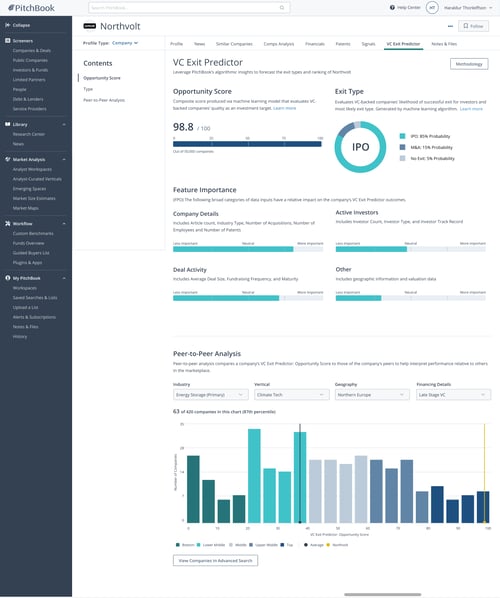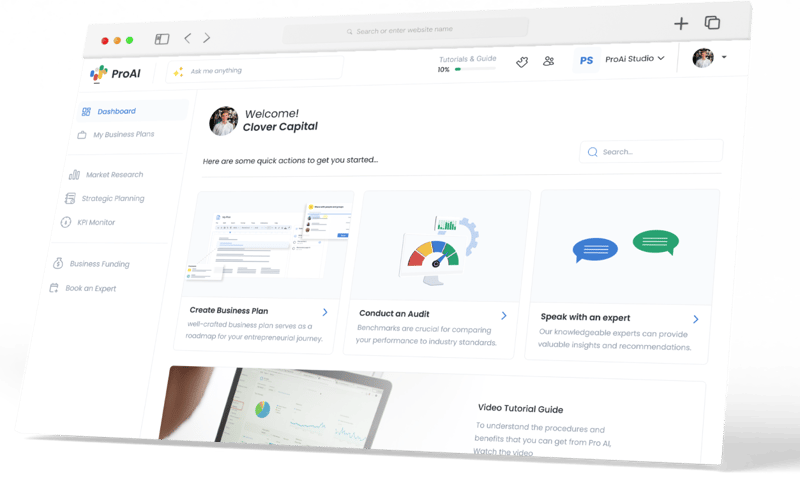Introduction
Artificial intelligence (AI) is swiftly changing the world around us, and the startup industry is no exception. From asking your smart home devices to turn the lights on in your home office to enabling a chatbot on your website to handle basic customer requests, AI is changing how we live and work.
The AI market itself is expected to reach a value of $407B by 2027, and a Forbes Advisor survey found that 64% of respondents believe this technology could increase productivity.

For startups, this shows huge potential in utilizing AI to, as they say, work smarter and not harder. AI tools are already helping startups create marketing materials, brainstorm content ideas, and even send follow-up emails to leads and customers. AI tools will continue to impact the startup landscape moving forward, so making use of these tools sooner rather than later can help give new businesses a better start.
 “Already, AI allows for significant economic effects through optimization, increased efficiency, acceleration, and simplification of many processes that previously required significantly more resources and competencies,” Dima Maslennikov, founder of PitchBob.io, told HubSpot for Startups. “Support services, IT development, document flow, knowledge management, staffing — AI and generative AI are already penetrating all spheres and bringing economic value to those who understand and are not afraid to use them.”
“Already, AI allows for significant economic effects through optimization, increased efficiency, acceleration, and simplification of many processes that previously required significantly more resources and competencies,” Dima Maslennikov, founder of PitchBob.io, told HubSpot for Startups. “Support services, IT development, document flow, knowledge management, staffing — AI and generative AI are already penetrating all spheres and bringing economic value to those who understand and are not afraid to use them.”
How is AI changing the startup landscape?
AI isn’t necessarily new to the startup landscape. Although talk of AI has seemed to explode in the last few years with ChatGPT making headlines, startups and businesses have been using AI in many ways since the 1980s and 1990s. As Logyc reported, some industries used AI in the 1980s to help with tasks such as credit risk assessment.
As access to the internet became more commonplace in the 1990s and 2000s, AI became a staple for many businesses. This technology helps respond to customer questions via a chatbot, make personalized recommendations to shoppers based on their browsing or purchase histories, or speed up transactions with AI-powered checkout systems.
Today, companies can use AI for just about every aspect of running the business. AI tools allow companies of any size to generate fresh ideas for blogs or social media posts and can even develop the text, images, and videos for content. For a startup, this can mean saving money on content creation when funding is tight.
AI can also help detect the most promising leads, so a small team can spend more of their time on these leads rather than on someone who isn’t likely to convert. AI tools are even available to help startups build out pitch decks or complete market research when it’s time to start pitching to investors.
AI can even predict whether a startup will succeed. Take, for instance, a new tool from PitchBook called VC Exit Predictor, which analyzes a startup, then provides a probability of whether the startup will successfully exit, get acquired, or not exit. Tests have found the tool to be about 74% accurate, and it could help startups size up the competition or strengthen their case to investors.
 Image credits: PitchBook
Image credits: PitchBook
This tool and other AI resources aren’t perfect, but they continue to change how startups, and companies of any size, do business. In the future, they could be fine-tuned for improved accuracy and resourcefulness, and it could be easier to adapt and grow with the technology rather than playing catch up later.
“In my opinion, companies and executives who don’t shift their mindsets on the application of AI risk being left on the sidelines of history,” Maslennikov said. “Those who understand the value, potential, and growing opportunities and learn to apply AI, overcoming internal limitations, will be successful. And the key to this success is in the first step — the mindset shift.”
How will AI change startup teams?
Startup teams, whether small and scrappy or rapidly growing and spread out globally, can use AI for quicker, clearer communication, improved training, and boosted productivity. According to HubSpot’s State of Artificial Intelligence Report, AI is saving the average worker about 2.5 hours per day on repetitive tasks, instead allowing employees to put their energy toward high-priority tasks.
For instance, a sales rep can save about two hours per day with AI, and marketing teams could save three or more hours in content development, whether they get AI assistance through brainstorming, writing, editing, or creating visuals.
Maslennikov uses AI in several ways at PitchBob.io, especially for communication and alignment across teams. “In our case [at PitchBob.io], we strive to use AI to assist employees in generating new ideas, in obtaining safe and environmentally friendly feedback, in aligning their ideas with company priorities, in selecting relevant employees for the team, in matching duplicate ideas, and in supporting employees in the process of developing their ideas within the company perimeter,” Maslennikov explained.
Why are AI and ML important for startup growth?
AI and machine-learning (ML) are important for managing customer relationships, overseeing employees, organizing and making sense of financial data, and even predicting future growth so startups can be better prepared to scale.
First, AI tools can ultimately save startups money. Whether it’s saving employees’ time from completing repetitive tasks that a bot can take over or doing more with less, like developing images without expensive camera and video equipment, this technology can help a startup save money in an already tight budget, instead using those funds to invest in company expansion.
Machine-learning allows AI tools to quickly adopt a company’s voice and patterns to better respond to customers or develop marketing materials, so companies can spend less time programming software to do these tasks.
AI tools today can go even further, even helping to analyze business data and highlight important information to provide investors or make predictions for future revenue and growth. This allows startups to better prepare for the future with these deep-dive analyses of company data and competitors.
As for scaling, when it’s time to start developing new products or explore new markets, AI can help with these tasks, too. AI can make improved predictions for product-market fit, a common problem for startups that is one of the main reasons startups fail. AI tools can create product mockups in just a few hours compared to weeks or months and can collect and even assess customer feedback on beta tests quickly, providing startups with the information needed to launch new products and scale with confidence.
How does AI help entrepreneurs?
AI could become an essential part of a startup team moving forward. AI tools can serve as handy assistance to startup founders.
As MIT reported, AI can operate almost like a co-founder—sure, it’s not presenting the pitch deck with you, but it may help you find and reach out to potential investors or prepare said pitch deck.
AI can help with scheduling important meetings, sending emails, or even developing a brand’s identity. Entrepreneurs may not have the skills to design their own company logo or may struggle to even brainstorm company names, but AI can help with all of that.
Because there are many AI tools out there today that are low-cost or even free, some experts also believe this technology can make building a startup more accessible.
“From a startup founder's perspective, in my opinion, AI tools open an incredible window of opportunities for creating new products that will outperform all existing ones through (Gen) AI technologies, while not requiring significant resources and investments at the start, which significantly lowers the entry barrier for startups to create breakthrough solutions,” Maslennikov said.

AI’s impact on the overall startup landscape
Clearly, AI is changing how startups do business, from helping with client relationship management to developing product ideas and prototypes. Because AI is so versatile, AI tools are impacting the overall startup landscape, even changing the traditional trajectory that startups follow.
[image: graph comparing traditional startup process vs. AI startup process]
In a more traditional sense, startups tend to begin as “early-stage,” where the company is establishing its founding team, bootstrapping money, and developing a product prototype.
From there, startups move to the “growth” stage, where they typically go through the venture capital process. They’ll get money from investors, begin selling products, develop new products or improve upon existing products, grow their clientele, and scale.
Eventually, startups reach the “late-stage,” where they typically plan to exit. This often involves going public or perhaps merging with or being acquired by another business.
With AI assistance, startups may be able to afford to take even more risks, especially when AI tools exist that predict whether the startup will even exit. For one, startups can still follow a traditional trajectory with AI assistance, but they might be able to develop new products and scale at a faster pace.
Because AI allows startups to do more with less, they may stick to bootstrapping over pursuing VC funding. This could be important as startup funding has recently declined, even dropping 30% in 2023 despite major investments in—you guessed it—AI startups. Startups can scale with fewer team members and less money, so some founders may opt to stick with bootstrapping over getting investment funding in exchange for equity in the company.
For those that do pursue VC funding, startups using AI may be able to build more attractive pitches and business plans, because AI can comb through so much data on the startup, competitors, the target audience, and the market as a whole, allowing startups to paint a complete picture and clearer future predictions with AI assistance.
AI tools for pitching and securing funding
For startups who are ready to shift to utilizing AI, there are many ways to do so. One novel way to implement AI tools for startups is to tap into this technology to help pitch to investors and build a stronger case for a better shot at funding.
Some tools that may be helpful to startups looking to secure funding include:
- PitchBob — This AI tool offers several helpful services, mainly a pitch deck generator. The founder fills out a questionnaire about the startup they are building (don’t worry, the AI fondly called Bob can help with responses as needed), then the generative AI turns those responses into a sleek, easy-to-read pitch deck with 10 different designs for the founder to choose from. PitchBob can also help founders develop business plans, filling out forms for accelerator programs, prepare for investor questions, and more.
- ProAI — Investors are looking for a thorough business plan that considers the short- and long-term growth of the startup. ProAI is a tool that can help founders generate this type of business plan and even produce financial predictions and marketing plans to help take your startup to the next stage of growth. The tool also doubles as a sort of advisor that can answer any questions and offer advice and personalized strategies for the startup to follow to reach its goals.

- Pollfish — Startups rely on market research to make sure their idea will work in their target market and to properly reach out to the target audience. Traditionally, market research may involve setting up focus groups, conducting interviews, or writing up send sending surveys. Pollfish makes market research a cinch with survey templates and easy-to-build questionnaires that it sends to trusted, reliable survey respondents that match your startup’s target audience. From there, the AI presents the data clearly and even helps highlight important data and offers insights for you.
AI tools for product development and testing
AI is having a big impact on product development and testing for startups. Instead of spending a lot of money on design programs for mockups or prototype development, plus months of time to make and test these products, AI can design a mockup in just minutes or quickly provide testing insights.
For example, the following AI tools assist with startup product development:
- Miro Assist—Miro Assist is a tool that allows users to input prompts. The AI will then offer suggestions, expand ideas, or analyze customer feedback and provide suggestions based on that feedback. This allows startups to consider product improvements or content about the product, like how-to guides, all in a few clicks.
- JetBrains AI Service and In-IDE AI Assistant — This AI tool is the new right-hand man for startup founders. The AI assistant can answer questions about a product’s coding or even handle some of the more repetitive coding tasks, like testing, while also offering a summary of any changes and highlighting errors with suggested fixes. The AI Service provides access to a variety of large language models (LLMs) for a more user-friendly and efficient integrated development environment (IDE).
AI tools for go-to-market (GTM)
A go-to-market strategy is the plan a startup follows to launch a product to its target market, and fortunately, you’ll find several AI tools geared toward building and implementing a GTM strategy.
From building a website, no coding required, to writing valuable blog posts, there’s an AI tool to handle many different aspects of a GTM strategy. We’d be remiss not to mention the suite of tools HubSpot has in this category:
- One-Page AI Website Builder | HubSpot — The One-Page Website Builder uses HubSpot AI to create an engaging, one-page website to tell clients what your business is all about. Click through to answer a few prompts about your website and design preferences, and the website building will create a one-page site for your startup in minutes. You don’t have to know any coding to build or customize the website; once it creates the page, you can easily make changes in a user-friendly interface.
- Free AI Content Writer | HubSpot — Maybe you need help writing intriguing product copy, or you’re hoping to draw in leads through informative blog posts that match top search terms related to your industry. For startups, it can be hard to find the time or money to spend writing all of this copy, but the HubSpot AI Content Writer can help product valuable content in no time. The tool can help you brainstorm ideas, develop outlines, or even write copy to match a specified tone of voice, then, you can customize the final product to your liking.
- AI Social Caption Generator | HubSpot — Writing engaging captions may leave you stumped, but you can get fresh ideas and save time on brainstorming with the HubSpot AI Social Caption Generator. This tool allows you to create varying social captions for audiences on Instagram, Facebook, LinkedIn, and Twitter. Simply add in a prompt with some details of what the post is going to be about and the tone you’d like, and AI will handle the rest. From there, you can edit and customize the copy until it’s just right for your audience.
- Free AI Email Writer | HubSpot — According to a study by Slack and OnePoll, the average worker spends about 11 hours a week writing emails. For startups, this time could be better spent on other tasks, like product development or working on pitches for funding. Enter the HubSpot AI Email Writer, which can help you craft a variety of emails in far less time, whether you’re sending a cold pitch email or crafting full email marketing campaigns.
- Meta Description Generator | HubSpot — Startups can use informative blog posts to drive more website traffic and generate more leads, but blogs need to incorporate SEO for a better chance of ranking in search results. The Meta Description Generator helps develop optimized meta descriptions and SEO titles, meaning these elements will provide engaging information that encourages people to click through to your website when they are searching for information. The more people that click to read your content, the better your SEO. This tool automatically crafts these elements for you, so it’s one less writing task on your to-do list.
- Free AI Blog Writer | HubSpot — You can even craft entire blog posts with the right AI tool. HubSpot’s AI Blog Writer is a free tool that takes your prompt, then turns it into blog post ideas, an outline, or even a fully written blog post for your website. Perhaps you’ve written up most of a blog post, but you need help with a single paragraph or a conclusion; the AI Blog Writer can write smaller sections as needed, too.
- ChatSpot — Startup founders can use ChatSpot as their helpful new assistant. This tool can tackle a wide range of tasks, from image generation to analyzing company data into valuable insights. From writing a mission statement to analyzing competitors in the target market, ChatSpot is a handy AI tool that is transforming the startup landscape. Founders can do more with fewer resources, including creating content or helping with SEO. For HubSpot users, it can also help with CRM tasks.
- Free Chatbot Builder | HubSpot — Chatbots are becoming the norm for startups, as these AI-powered tools can help reserve sales reps’ time for the most promising leads while still helping customers get the answers they’re looking for. HubSpot’s Chatbot Builder allows you to create a customizable bot, no coding necessary. The bot can answer customer questions, qualify leads, and even provide personalized responses when integrated with your HubSpot CRM.
Want to read about other AI tools helping startups, check out How Startups are Optimizing GTM Strategy With AI.

AI tools for operations and scaling
A major goal for any startup is to scale, and investors are often looking for scaleability in a startup. Startups can begin scaling quickly if they gain the right attention, and some startups aren’t properly equipped for scaling fast, which can cause them to fall behind.
Operations and scaling tools powered by AI can help startups keep up when it’s time to scale. Some popular AI tools in this category include:
- Sifted Logistics Intelligence — This tool is helpful in managing your supply chain, even alerting you to any weaknesses in your shipping process that could disrupt supply and interrupt scaling. The system scores your shipping process weekly, allowing you to constantly improve for quicker deliveries and a better customer experience. It also helps you manage your relationships with shipping carriers and automate some of the administrative work, like handling contracts and billing.
- Eightfold.ai — When a startup is scaling, it needs to start hiring the right people to help grow the company. There’s an AI tool for hiring, too. Eightfold.ai is a talent acquisition and management tool that allows you to quickly find talent that matches your company’s needs, schedule interviews, and even help train new and existing employees. This tool also offers learning opportunities to your team, making it easier to hire from within as the company grows and requires more leadership roles.
- Splunk AI — Sifting through a lot of data for risks can be time-consuming, but Splunk AI helps monitor your business for anything out of the ordinary, like a dip in email sign-ups or website traffic. This allows startups to catch and fix any potential issues before they lead to downward trends. This AI tool monitors your workflows and your website, then sends alerts when it detects anything unusual.
AI tools for investor relationships
For startups that want to succeed, it is important to form a solid relationship with investors. Investors may stick with a startup for several months or even years, providing additional investments over the course of the relationship. So, maintaining a good relationship is important.
This can be done in a number of ways, including by staying transparent and up-to-date with business reports and minimizing the business risk to give the investor more peace of mind. Some AI tools that can help you with investor relations include:
- Create reports using AI (BETA) — HubSpot offers an AI tool that assists users in generating reports based on business data. You put in a prompt of what type of report you’re looking for, and the AI will pull together a report using details from your HubSpot account. From there, you can save reports to your dashboard.
- Crisp Thinking — Startups face a lot of risk, and while investors do assess risk and potential for high ROI before they invest in companies, they may be wary of investing again if risk heightens for the startup over time. Crisp Thinking is an AI tool that helps startups minimize and mitigate risks by monitoring and tracking potential risks, from harmful social media content that could hurt your brand to security threats. Crisp Thinking also helps address and prevent risks, keeping your startup and its investors safer.
AI is fast-tracking startup growth
Startups that adopt AI now aren’t just taking a few simple tasks off their to-do lists. This technology has quickly advanced and can do everything from answering calls and sending emails to generating visual content and detecting business risks before they become real problems.
AI can help startups manage their quickly-growing manufacturing and shipping networks, qualify and follow up with the best leads, develop product mockups and prototypes, and so much more.
This is changing the startup landscape, as it allows startups with fewer resources to get into their chosen industries, sometimes even skipping VC funding entirely and allowing startups to operate longer while bootstrapping.
Whether a startup decides to use a few simple AI tools or integrates AI into every part of the business, AI will soon become a must-have for companies that want to succeed. Without adopting AI tools, startups today risk falling behind.



 “Already, AI allows for significant economic effects through optimization, increased efficiency, acceleration, and simplification of many processes that previously required significantly more resources and competencies,” Dima Maslennikov, founder of
“Already, AI allows for significant economic effects through optimization, increased efficiency, acceleration, and simplification of many processes that previously required significantly more resources and competencies,” Dima Maslennikov, founder of  Image credits: PitchBook
Image credits: PitchBook




